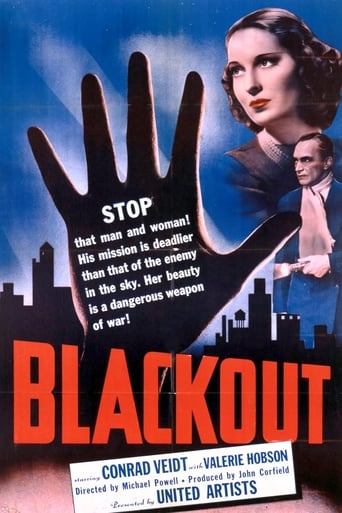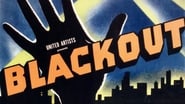blanche-2
"Contraband" is a Powell/Pressburger collaboration, and a lot of the techniques they use are reminiscent of later films, such as the 49th Parallel and "The Red Shoes."The story concerns a Dane, Captain Anderson (Conrad Veidt) on a freighter that is stopped for inspection by a British warship. He asks for passes for himself and his first officer, but when he is ready to leave, he finds that the passes have been stolen by two passengers, Mrs. Sorenson (Valerie Hobson) and Mr. Pidgeon (Esmond Knight). He rows to shore and finds Mrs. Sorenson and decides to stick to her like glue. Before long he's involved with a German spy ring.This is a good film with both Veidt and Hobson giving wonderful performances. They have good chemistry and the script gives them the opportunity for some repartee. The background of the movie is interesting. One message was to to elicit compassion from the Scandinavians, as they emerge here as the heroes. Obviously it was before Denmark was invaded, and the British hoped to have their help. The last scenes are quite exciting. This doesn't come up to a 39 Steps but it's still enjoyable.
Alex da Silva
Conrad Veidt (Captain Andersen) is the skipper of a Danish boat that has been intercepted by the British and brought to dock in England while the cargo is processed. An overnight stay is required before he can proceed. He is also carrying passengers and he makes it his business that they do not abscond overnight. His mission is to deliver his cargo and not to lose any passengers. This, above all else. Well, Valerie Hobson (Mrs Sorensen) and Esmond Knight (Mr Pidgeon) have other plans, and duly abscond. Veidt has one night to track them down and ensure that they are back on his ship when it is due to sail in the morning.This film has an alternate title of "Blackout" and it's very significant seeing that you can't see what's going on during several scenes. It's a shame because it's an engaging spy story. Conrad Veidt is excellent in the lead – he is very much his own man, and manages to draw some humour out of his arrogant portrayal making him likable. He is loyal to his principles and that is to be admired. He gets some funny dialogue as well as throwing in some nice touches such as when he rows ashore to begin his chase, and he keeps repeating the name of Mr Pidgeon. With each pull of the oar we hear "Mr Pidgeon". It's funny and you know that it is really annoying him! However, set against this, the film is marred by silly comedy sections that always seem to include Hay Petrie in a dual role of brothers. The film really did not need him, yet alone two of him. Aaargh. Lose points for that, I'm afraid.You can tell that this is a fun, spy story with some tense moments. However, the tension is taken away because you can't see the blasted thing and there is way too much comedy.
robert-temple-1
This film, released both as CONTRABAND and as BLACKOUT, is a highly superior suspense and espionage film of the immediate pre-War period. The stars are Conrad Veidt and Valerie Hobson, and the chemistry between them is almost as good as that between Bogart and Bacall in CASABLANCA (1942, in which, by the way, Veidt also appeared). Little can anyone have realized when this film was made, but Veidt had very little time left to live. He dropped dead while playing golf in 1943 at the age of only 50. Veidt and his third wife, who was Jewish, fled Germany to escape the Nazis in 1933, and settled in England. Germany's loss was England and America's gain, for Veidt, as a famous German star, had an effortless magnetism and enormous talent on screen. He lent gravitas to many a shaky part. Here he plays a Danish ship's captain, thus excusing his accent, which was of course really a German one. But the English public had little familiarity with the Danes since the Danish Vikings departed several hundred years earlier, so they did not notice the difference. (Lots of very blond people in the north-east of England are what the Danish Vikings left behind.) In the film there is a large Danish restaurant called Viking in the middle of London, where people dress in white tie for dinner and eat lots of herrings and have exotic haute cuisine and excellent wines. I wonder if any such Scandinavian gastronomic outpost ever really existed in London at any time. For a passionate herring-lover like myself, if only! (The best way to cook a herring is Scottish-style. And I bet you don't get many recipes in IMDb reviews, but here goes. Dip it in milk, roll it in organic oatmeal, gently pan-fry it in a modicum of pheasant fat, or if you can't find any then use goose fat. Allow to become brown and crisp. After eating, skin and oats and all, have tranquillizers ready to help you recover from the ecstatic culinary experience. And that is enough food for today.) This film was made before Denmark was invaded by the Nazis, so there is a great deal of Danish patriotism on display, including all the waiters and the proprietor of the Viking joining up to help Veidt and singing a patriotic Danish song. Valerie Hobson plays Mrs. Soerensen, a British divorcée whose ex-husband is Danish. In reality, she is an intrepid British spy. Veidt's Danish ship on its way back to Denmark is diverted into harbour in Britain for contraband inspection, and Valerie Hobson and a spy accomplice steal Veidt's landing permits in order to make a dash for London on their secret business. Veidt is annoyed and chases after them, but has no British money with him, which means he cannot even pay for a taxi when he arrives in London. He and Hobson end up becoming entangled first in complex spy activities, being captured and tied up by Nazi spies in London, and then become romantically entangled as well because they are irresistibly attracted to one another. So the ingredient of romance, tinged with irony, runs through the action. Valerie Hobson really shines in this film. She was amazingly beautiful at that time and what is called 'an absolute charmer'. And she has the most intense bedroom eyes, to which Veidt is far from indifferent. This film featured a number of interesting early appearances and non-appearances. Deborah Kerr got her first job in a film playing a cigarette girl, but her scenes ended up on the cutting room floor, which must have added to the attractiveness of the floor, if not to the elevation of the young actress's expectations. Leo Genn and Peter Bull, such sturdy stalwarts of the British film business over decades, appear in supporting roles. Countless of us knew Peter Bull from his astrology shop in Notting Hill Gate, where until his death in 1984, it was always amusing to go in and browse and engage him in conversation about all the old movies he had been in and hear his bombastic and witty exposes of the foibles of his colleagues and racy tales of calamities on the set and on location. He was never a shy person and relished being drolly gay. Bernard Miles fixes a pipe in this film and Milo O'Shea is an air raid warden, his first film appearance, and more fortunate than Deborah Kerr in that he was not cut out. The blackout scenes in London are very informative and interesting, being entirely accurate. One learns, for instance, that the traffic lights at night shone only through small crosses cut in the centres of the shades in front of the lights (this can be seen in a scene where Veidt and Hobson are crossing a street). The film is thus remarkably informative about the conditions of early wartime London, and thus has a considerable historical importance. For those who like shots of old naval ships, there are plenty of those to see steaming around. The snappy editing of this film is by John Seabourne, Senior, skills which were later to be used to heighten the eerie dramatic power of THE ROCKING HORSE WINNER (1949) in particular. He is certainly an under-appreciated talent of the period, who left the industry in 1959 (born in 1890, no date of death is recorded for him on IMDb) after editing 39 films, several of them classics such as I KNOW WHERE I'M GOING (1945) and A CANTERBURY TALE (1944). This film was directed by the talented Michael Powell and the original story and screenplay are by his Romanian/Hungarian/Jewish collaborator Emeric Pressburger. They would go on to make together 49th PARALLEL (1941, see my review), several films with the editor John Seabourne, and would become world famous with THE RED SHOES (1948), along with countless other films which are fundamental to British cinema history.




